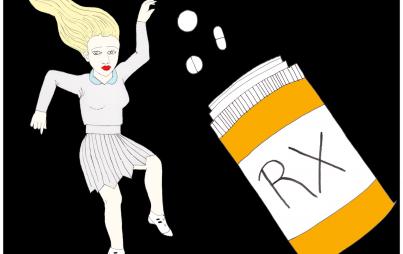
That’s the thing about recovery: if you stick with it, it introduces you to yourself.
When I decided to get sober, I simply wanted help to stop drowning myself in four bottles of wine a day; I certainly didn’t envision digging up my painful relationship history.
Thinking back six years later, I had no idea how much work lay ahead of me, and no clue how much my childhood would influence both who I am as a woman and how I relate to others.
The process of recovery isn't easy. It involves slowly peeling back the layers we’ve accumulated over a lifetime of using substances to numb our pain. We have to determine what’s underneath our desire to escape. To fully heal, we have to recover from trauma(s), mental illnesses, and the lack of emotional nourishment we received as children. That’s the thing about recovery: if you stick with it, it introduces you to yourself. It also revolutionizes everything, including how you relate to yourself and others. You have no choice but to learn about how you behave in relationships because you can’t walk through life without people.
For the first few years of my recovery, I had no clue that many of my relationship disasters were a direct reflection of my attachment style. I just continued my dysfunctional cycle of one failed relationship/encounter after another. Each time I was more and more flummoxed as to why I had such palpable fear of abandonment on the first date. I was equally perplexed as to why I would spend my days obsessing over when I’d see them again. My stomach would jump every time they texted. Why don’t they like me? Why haven’t I heard from them? The words "needy" and "fearful" feel like an understatement. I had no idea why I was this way.
That’s the thing about recovery: if you stick with it, it introduces you to yourself. It also revolutionizes everything, including how you relate to yourself and others. You have no choice but to learn about how you behave in relationships because you can’t walk through life without people.
Over the years I’ve been sober, I’ve witnessed the same continuum of recovery in my peers. First, you have to get sober and learn how to stay sober. Then, you need to learn how to cope with life. Once you’ve established that baseline, then comes emotional development, self-regulation, healing our bodies, and relational recovery. Or, as my therapist tells me, it’s only when you’re a few years into recovery that you have the capacity to deal with learning these painful lessons.
The pains from relational growth are some of the scariest lessons we face. In some ways, I found dealing with them to be harder than getting sober because my ability to form and maintain relationships was so deeply and inextricably linked to my childhood and my trauma. I couldn’t heal without digging up, sifting through, and analyzing the past. And I’m not alone — I’m part of a community of women who have shared that they too have a dysfunctional relationship or relationship history.
Therapist Veronica Valli, who is also in long-term recovery, says:
"I didn't have relationships, I took hostages, because I was so scared that no one would love me or that if they got close to me, they would leave. In recovery, the pain of abandonment was far harder as I didn't have the anesthetic of alcohol. It turns out this was a gift, as the pain motivated me to work really hard on myself to resolve my attachment/abandonment issues that had always fueled my drinking."
After several rounds of thinking I’ve found "The One" and quickly ending up in a heap of pain and misery when I could no longer guilt them into seeing me, I finally decided to get help. I couldn’t fathom how I was five years into recovery, had relocated to a different continent and started a business on my own, and yet was still an adolescent in relationships. I had to learn about who I am and how my attachment style affects the people I choose to date, and why I act in such a fearful way in relationships.
You Might Also Like: How To Be Sober And Still Have A Social Life
Attachment styles are formed between children and their parents at a young age. They impact how that child develops into an adult and the types of and level of intimacy of relationships with friends, family, and romantic relationships we seek as we attempt to replicate the same type of attachment in our relationships. Studies also show that attachment styles are so fundamental to our development that they can even affect the person's ability to regulate emotions and critical hormonal functions, as well as their predisposition to substance use disorder.
The different types of attachment can be separated into healthy and unhealthy categories. If children have formed secure attachments with their parents, that will follow them through to adulthood. A secure attachment style is associated with confidence, security, ability to communicate with others, and a tendency to meet their own needs and those of their partner. Conversely, if a child develops an insecure attachment, they tend to seek high levels of intimacy, approval, and responsiveness from romantic relationships.
The types of insecure attachments are:
1. Anxious-preoccupied.
This style is often characterized as “clingy.” The person seeks high levels of intimacy, approval, and responsiveness from partners.
2. Dismissive-avoidant.
This is indicated by a desire for a great deal of independence and the sense that they’ll never get too close to others.
3. Fearful-avoidant.
This style is characterized by a person experiencing mixed feelings about close relationships. While they desire to have intimate relationships, they feel uncomfortable with being too emotionally close to a person.
My style is insecure. I’m anxious-preoccupied — as if that wasn’t obvious! When I discovered that, it changed everything. I finally understood why I sought out substances to numb the constant fear of abandonment, as well as why I sought out insecure attachments in my relationships. I dated dismissive-avoidant people and fearful-avoidant people. These styles replicate my parents’ attachment styles; one is anxious-preoccupied and the other dismissive-avoidant.
What saddened me about this lesson is that I’ve berated myself for years for feeling so needy. I hated feeling that way. I caused myself a lot of anguish and distress over the years in these types of relationships. I felt like I was perpetually seeking a level of intimacy that wasn’t within any person’s ability to give me.
The reality is that I didn’t have the skills to have healthy functional relationships — I was never taught! The people I pursued relationships with were unable to give me any kind of intimacy because of their own insecurities.
Now I know more about myself. I know that I need to be able to provide myself with the level of safety and security that I so desperately sought externally. It is from that place that I can seek relationships with others who have formed healthy, secure attachments so that they can provide the level of emotional intimacy I need.








